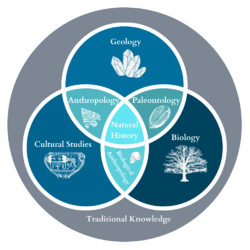Difference between revisions of "Education Committee"
(→Other Collections Resources) |
|||
| Line 24: | Line 24: | ||
* [https://qubeshub.org/community/groups/collections/resource_collection Published Natural History Educational Materials] | * [https://qubeshub.org/community/groups/collections/resource_collection Published Natural History Educational Materials] | ||
* [https://qubeshub.org/community/groups/collections/participate Instructions on how to publish a resource to QUBES] | * [https://qubeshub.org/community/groups/collections/participate Instructions on how to publish a resource to QUBES] | ||
| + | |||
| + | == Collections Education Events == | ||
| + | |||
| + | === Natural History Education DemoCamp === | ||
| + | |||
| + | The [https://spnhc.org/education-democamp/ Natural History Education (NHE) DemoCamp] is designed to provide materials and resources to teachers, educators, and faculty looking for easy to adopt educational materials that engage students with the natural world. Held virtually (annually, usually in June) the NHE DemoCamp provides opportunities to discuss open education resources resources with the teachers and educators who developed the materials. For the presenters, the NHE DemoCamp provides a platform to share your resources and materials, and creates a place to exchange ideas and receive feedback from your peers. | ||
=== Other Collections Resources === | === Other Collections Resources === | ||
Revision as of 16:35, 13 December 2022
Contents
About
Function
The Society for the Preservation of Natural History Collections Education Committee will work to develop, support, and promote formal (K-12, Undergraduate and Graduate) and informal education, and outreach relative to natural history collections and biodiversity science as informed by natural history collections. The Education Committee will work closely with the Inclusion, Diversity, Education and Access (IDEA) Committee to encourage education and outreach activities and materials that facilitate diverse and inclusive participation in the natural sciences, and promote activities that support the inclusion and retention of individuals of all identity groups within the collections field and associated scientific disciplines. When appropriate, the Education Committee will work alongside other SPNHC committees and support the planning, organization, and delivery of workshops and mentorship activities in association with annual meetings. The Education Committee members will maintain a branch of the SPNHC Wik, a QUBESHub site of education and outreach resources, and communicate Education activities and resources through social media.
Leadership and Composition
The committee consists of a Chairperson or two Co-Chairpersons, a Secretary or two Co-Secretaries and any number of SPNHC members from a variety of disciplines and other SPNHC committees, as interested. Committee members are encouraged to represent the work of the Education Committee as they participate in other SPNHC committees. The participation or representation from SPNHC members from other societies representing the natural sciences is encouraged.
Duties
- Organize and host a committee meeting during the SPNHC annual conference and additional virtual meetings throughout the year as required/desired to accomplish tasks and achieve goals.
- Update the Society on the committee’s activity and findings via the SPNHC Connection newsletter and reports to the Council and Annual Business Meeting.
- Alongside Biodiversity Literacy in Undergraduate Education (BLUE), Integrated Digitized BioCollections (iDigBio) and affiliated societies as identified, run an annual Natural History Collection DemoCamp
- Maintain Natural History Education QUBESHub page that provides access to education and outreach modules and connects Society members to a broader network across institutions and organizations.
- Design and maintain a SPNHC Education Webpage.
Collections Education Resources
Natural History Education Portal
The SPNHC Education Committee manages the Natural History Education Portal housed through QUBESHub (supported by BioQUEST). This portal is a product of the collaboration that began between QUBES and the Biodiversity Literacy in Undergraduate Education (BLUE) projects. The vision for this portal is to create a space for the broader natural history education community to aggregate and disseminate resources. All individuals and projects with natural history (collections-based and beyond) educational materials for any grade levels, disciplines, and topics are invited to publish materials to this portal.
Collections Education Events
Natural History Education DemoCamp
The Natural History Education (NHE) DemoCamp is designed to provide materials and resources to teachers, educators, and faculty looking for easy to adopt educational materials that engage students with the natural world. Held virtually (annually, usually in June) the NHE DemoCamp provides opportunities to discuss open education resources resources with the teachers and educators who developed the materials. For the presenters, the NHE DemoCamp provides a platform to share your resources and materials, and creates a place to exchange ideas and receive feedback from your peers.
Other Collections Resources
BLUE is a community of biodiversity, data, and education specialists who are working together to identify core biodiversity data competencies for undergraduates, develop strategies for integrating these competencies into the introductory biology curriculum, and build capacity for sustained development and implementation of biodiversity and data literacy education. You can find more about BLUE here: https://www.biodiversityliteracy.com
BCEENET is a community of undergraduate educators, natural history curators, education experts, and data experts who support the development and implementation of Course-based Undergraduate Research Experiences (CUREs) in ecology and evolution, using data from digitized natural history collections (dNHCs). Undergraduate research increases student engagement, retention, and long-term success and is essential for building a scientifically literate and engaged workforce, and embedding research experiences in courses is especially important for underrepresented students who may experience barriers to accessing traditional research experiences. You can find more about BCEENET here: https://bceenetwork.org/
Feel free to add your resources, projects, or other education-related materials here!
Committee Members
Up-to-date membership for committee.
